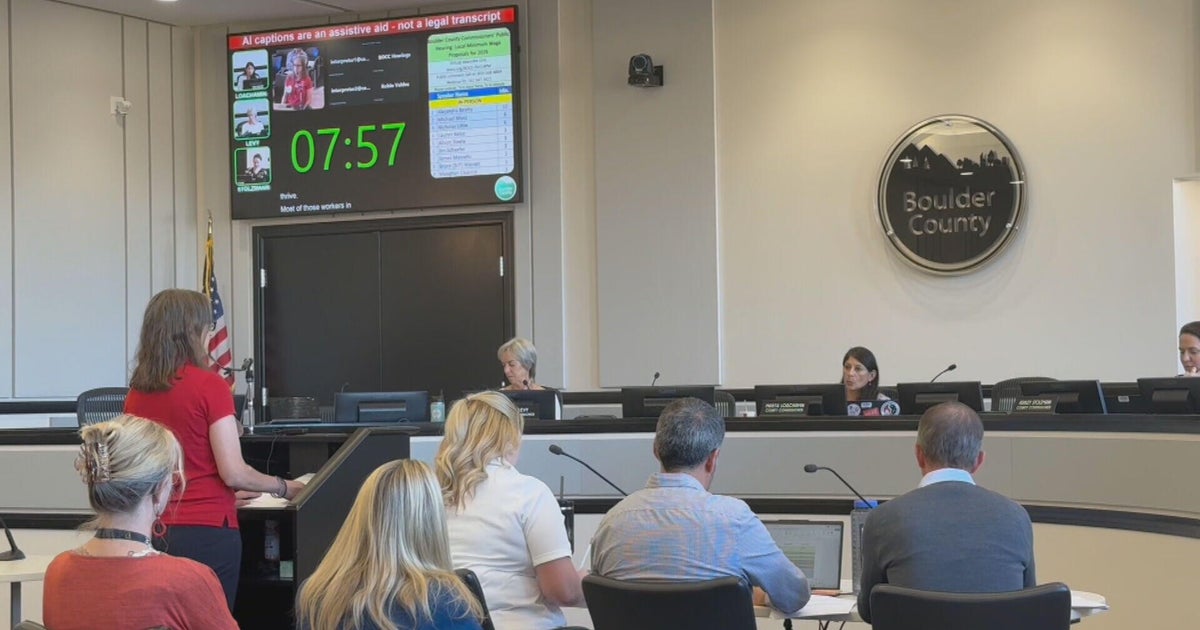On the fifty acres of the Kilt Farm, Michael Moss is letting his fields recover by going fallow this year. And he’s thinking about continuing farming.
“If it’s going to be elitist, if it’s going to be so small and so expensive, the numbers just stop working out. It just doesn’t make sense anymore.” Moss is referring to the county’s rising minimum wage. In 2025, it’s $16.57 an hour. But ahead are steep percentage increases. By 2030, unincorporated Boulder County will have a minimum wage of $25 an hour.

Kilt Farm in Boulder County.
CBS
His organic farm is small. Only 50 acres.
“We don’t have the efficiencies of scale. You know 60 different types of vegetables. You know we may have a block of carrots and right next to it is a block of beans, and we have our tomatoes,” he explained. “So we don’t have the opportunity to use big equipment. We use our hands. We bring in a lot of labor.”
He pays somewhere between $17 and $20 an hour right now. That’s over the current minimum. But in a couple of years, it will rise to over $20 an hour. In cities and towns in Boulder County that set their own wages, the rate will be far lower.
“Literally, we will be paying in 2030, $25 an hour, and Longmont, which is five miles away, will pay $17, an $8 difference for somebody that’s doing the same job, and we have no choice,” said Allison Steele, co-owner of the Niwot Market with her brother. She notes that they often hire young people who are learning to work, teaching them work skills they often don’t yet have.
“You cannot justify paying a 15-year-old $25 an hour. You just can’t,” said Steele.
Boulder County Commissioners envisioned the rising wage as the lead on a trend. When the change in the minimum wage was passed in late 2023, there were hopes that the cities and towns would join them. They haven’t.
“We’re having to pay them more and more and more. And the writing’s on the wall that by 2030 it’s $25 an hour, it’s not going to be viable,” said Moss.
Both addressed Boulder County Commissioners in a public comment hearing on Tuesday afternoon. As did labor organizers.

Boulder County Commissioners in a public comment hearing.
CBS
“There has rarely been a more important time to avoid putting working people and their families further into economic hardship,” said Karl Lapham, lead organizer for non-profit advocacy organization, New Era Colorado.
“I am disheartened to say that in a year and a change that I have been an organizer in Colorado, this is my fourth hearing that I have attended in which elected officials want to cut the wages of tens and thousands of workers.”
A county staff report shows that unincorporated Boulder County has a labor force estimated at 22,216 people. It’s unclear how many earn only minimum wage. But labor organizers hoped to gain a foothold on higher wages with the county’s move.
“It’s one of those lynchpins. Like if you can’t make sure that the least paid workers are getting better, then how can you start on others?” asked Alejandra Beaty, President of the Boulder Area Labor Council of the AFL-CIO. The county’s cities and towns, she believes, need to step up.
“They need to get on board. They need to be good neighbors and help,” she said. On small businesses, she suggested the county look at tax credits for paying workers a higher wage. “We want to see them thrive, too. But we just don’t want to keep seeing it paying people poverty wages.”
The commission said it would decide on whether to pursue change and which of the five potential scenarios or other options to pursue in a work session next week. Any change to the minimum wage schedule approved in late 2023 would need a vote, with a first reading of any such proposal coming in November.

